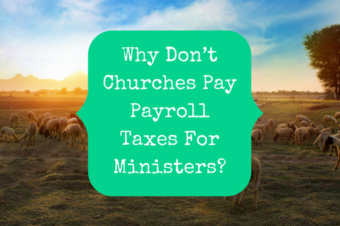
Because a pastor’s opportunity to opt out of Social Security is so unique, many Social Security employees don’t understand the law surrounding it. Unfortunately, this results in pastors being denied benefits that are rightfully theirs. This is what you can do to appeal the decision if it happens to you.
Just because you’ve opted out of Social Security as a pastor doesn’t mean you can’t be eligible for benefits based on your secular work history. And just because you opted out doesn’t mean that you can’t be on Medicare. Unfortunately, not all Social Security Administration (SSA) employees understand this and it can create problems for pastors applying for benefits. Here are a few of the stories I’ve heard recently:
“I worked secular jobs both prior to opting out of Social Security and after. My local Social Security office says that the credits I earned prior to opting out don’t count but the later ones do.”
“I have been denied benefits from my non-ministerial income because I opted out and signed Form 4361 for my ministerial income.”
“Because I opted out, the local Social Security office says that I am not eligible for Medicare through my wife (who is eligible) and I cannot even purchase it.”
All three of those are examples of pastors who have a legal right to benefits but are being denied them out of ignorance. While I wish I could round up the 60,000 SSA employees and explain to them how it all works, I think it would be easier to just teach pastors like you how to appeal their erroneous decisions. So, here we go:
Have Proof Of Your Work History
Social Security benefits are based on your work history, so that’s the first thing you need to get. This should be fairly simple since it is easily accessible through the SSA’s website. Just follow this link to set up an account and you will be able to see the work history that they have for you. You can see an example in this article. If it is accurate, you’re all set. You might want to print it out so it is easy to show the people in your local Social Security office when you speak with them.
If it isn’t accurate, you’ll have a bit more work on your hands. For them to change their records, you will need to show proof of your past taxable Social Security income and what you paid into the system. This can be old pay stubs, W-2s or tax returns. If you don’t have proof, you can contact previous employers and hope that they still have their records. Once you have your proof, set an appointment with your local Social Security office so you can take them the proof and have them update your information.
Make Sure You Have The Necessary Credits
Just because you worked a secular job doesn’t mean you’re automatically eligible for benefits. You need to have earned a certain number of credits. Read how credits are earned and how you can be eligible for benefits even after opting out by following the links. If you have enough credits for benefits (or your spouse does) and you have still been denied, it’s time to file a Request for Reconsideration.
File Form SSA-561-U2: Request For Reconsideration
This is the form you file if you disagree with the SSA’s initial determination of benefits. On the form, you state your disagreement, give a brief explanation of your reasoning and provide your contact information so that they can connect with you. The policy is that the form must be filed within 60 days (plus 5 days for mailing time) of the initial determination.
However, if you have missed that deadline, you can still file the form. You just need a “good cause” statement in writing telling why you need and deserve an extension of the time limit. Don’t let anyone tell you this isn’t possible. The SSA’s Program Operation Manual spells out the option right here.
If you mail the form, you should send it certified so that you will receive a receipt. You should also ask for a receipt if you turn it in in person. Save your email confirmation if you fill out and file the form electronically. Keep copies of everything you send in for your records.
Gather Proof To Support Your Request
You are going to need proof to support your request. If they aren’t giving you credit for your secular work, bring them your work history. Opting out of Social Security only affects your ministerial income. If they disagree, you can show them that the SSA’s Program Operation Manual found here states:
The granting of an exemption to a minister applies to ministerial earnings does not preclude the payment of benefits based upon other covered work, nor does it prevent a clergyman from enrolling in the SMI program.
Translation: Opting out as a minister has no effect on your ability to receive benefits for secular work you have performed. SMI stands for Supplementary Medical Insurance, which is commonly known as Medicare Part B. The SSA’s Program Operation Manual discusses SMI/Part B eligibility here.
You can read the actual law regarding the ministerial exemption in the Internal Revenue Code Section 1402(e)(4) here.
Speak With A Technical Expert
Most SSA employees are not experts in the law, which is why you’re in this predicament in the first place. They do, however, have “technical experts” available that know the law. If you’re having trouble, insist on speaking to a technical expert, whether in person or over the phone. Again, don’t take no for an answer. Follow the example of the persistent widow from Luke 18 and don’t give up until you get justice.
Seek A Hearing
If you don’t get a favorable response from your Request for Reconsideration, you can ask for a hearing in front of an administrative judge. Your case will first be reviewed by an appeals council who will either decide the case or send it to the administrative judge to decide. Once your case gets this far, it would be wise to consult with a lawyer or other trained advocate who specializes in working with the SSA.
If you’re one of the many pastors dealing with this, I’m sincerely sorry. You’ve paid into the system for years and should be treated better. I hope the information in this article helps you in your fight for your rightful benefits.
What about you? Have you had problems with the Social Security Administration? What happened and how was it resolved?




1 Response